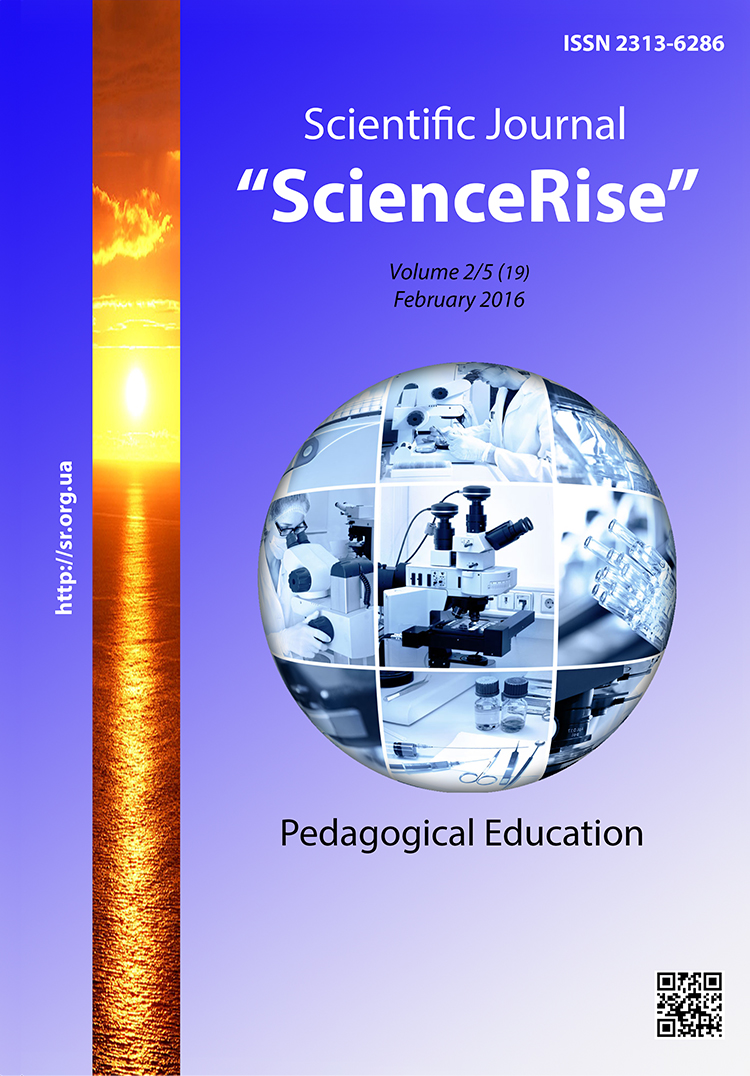Training future teachers for aesthetisation of the educational environment of elementary school
DOI:
https://doi.org/10.15587/2313-8416.2016.60509Keywords:
aesthetic therapy, personal creative development, psychologically comfortable environment, professional training of the teacher, aesthetic therapy functionsAbstract
In the article is grounded the necessity of actualization of pedagogical aesthetic potential on the background of the modern humanocentric approaches in education.
There is presented the new axiology of the high education that is aesthetically therapeutic in its substance. It presupposes the creation and transformation of elementary school according to the spiritual and aesthetic principles of individual creative self-realization in information society.
Aesthetic therapy is considered as an independent field of integrative scientific knowledge about means and methods of creation by the teacher psychologically comfortable educational space that can renew the natural harmony of the modern human being with environment, to give it the possibilities for individual creative self-development. Aesthetic therapy includes the concealed instructions for saving integrity and developing personal creative potential, the spiritual kernel of the person.
The special attention is paid to such meaningful aspects of pedagogical professional education: analysis of the modern state of educational environment, pedagogical abilities to aesthetics in learning and upbringing pupils of elementary school, psychological and pedagogical functions of aesthetic therapy.
There is presented the structure of aesthetic therapy means in the work of elementary school teacher: social ones, natural ones, artistic ones. There is characterized the author seven-staged substantive algorithm of training teachers for use the main technologies and means of aesthetic therapy in their professional activity
References
Slastenin, V. A., Podumova, L. S., (1997). Pedagogy: Innovational activities. Moscow: MastersPublisher, 224, 73–79.
Alekseenko, T. F., Onychenko, V. M., Ball, G. O. et. al; Kremen, V. G. (Ed.) (2010). White Book of National Education of Ukraine. Kyiv: Informationalsystems, 342, 56.
Kagan, M. S.(2007). System-synergetic approach towardsconstruction of the Modernpedagogic theory. Synerhetycheskaya paradigm. Synergetics education. Moscow: Progress-Tradition, 212–245.
Ridings, B. (2010). University in ruins. Moscow: Publishing house, 304.
Robinson, K. (2013). Education against talent. Moscow: Mann, Ivanov and Ferber, Eksmo, 336.
Chumak, O. V. (2012). Paradigm Education XXI century: innovative aspects. Personality in a single educational space. Available at: http://virtkafedra.ucoz.ua/el_gurnal/pages/vyp7/konf1/Chumak.pdf
Kremen, V. G. (2009). Personality in the modern civilization: the educational context. Universitates: Science and Education, 1, 28–32.
Drescher, U. N., Klyuchenko, T. I. (2002). Bilbo-therapeutic activities of the libraries in the context of information and psychotherapeutic security. Kazan. Available at: http://www.gpntb.ru/win/inter-events/crimea2002/trud/sec1114/doc77.HTML
Hёbel, V., Glöckler, M.; Fedorov, N. (Ed.) (1998). Child:from infancy to adulthood. Moscow: Enigma – AST Publishing House, 592.
Kiyashchenko, N. I. (2005). Aesthetics – philosophical science. Moscow: Publishing house. Williams House, 592.
Fediy, O. A. (2012). Aesthetotherapy. Kyiv: "Publisher" Center of educational literature ", 304.
Fediy, O. A. (2010). Theory and practice of training teachers to use of Aesthetotherapy in their professional activity. Kyiv, 500.
Downloads
Published
Issue
Section
License
Copyright (c) 2016 Ольга Андріївна Федій

This work is licensed under a Creative Commons Attribution 4.0 International License.
Our journal abides by the Creative Commons CC BY copyright rights and permissions for open access journals.
Authors, who are published in this journal, agree to the following conditions:
1. The authors reserve the right to authorship of the work and pass the first publication right of this work to the journal under the terms of a Creative Commons CC BY, which allows others to freely distribute the published research with the obligatory reference to the authors of the original work and the first publication of the work in this journal.
2. The authors have the right to conclude separate supplement agreements that relate to non-exclusive work distribution in the form in which it has been published by the journal (for example, to upload the work to the online storage of the journal or publish it as part of a monograph), provided that the reference to the first publication of the work in this journal is included.

